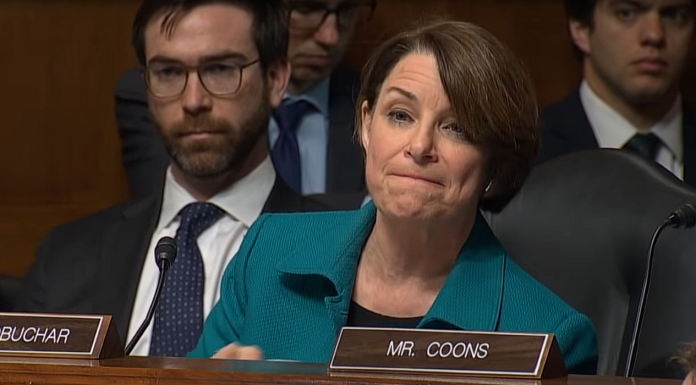(Headline USA) Republicans powered Supreme Court nominee Amy Coney Barrett closer to confirmation Thursday, pushing past Democratic objections and other priorities during the COVID-19 crisis in the drive to seat President Donald Trump’s pick before the Nov. 3 election.
The Senate Judiciary Committee set Oct. 22 for its vote to recommend Barrett’s nomination to the full Senate, with a final confirmation vote expected by month’s end.
Stakes are high for all sides. Liberals pounced when top Democrat Sen. Dianne Feinstein of California hugged the chairman, Sen. Lindsey Graham, R-S.C., as days of hearings closed, praising his handling of the process. They called for her immediate removal from leadership.
After three days of desperate attacks, including hyped up claims that Barrett would do away with Obamacare and abortion and LGBT rights, many of the committee’s Democrats resorted to two-word statements.
“A sham,” said Sen. Amy Klobuchar, D-Minn.
“Power grab,” protested Sen. Richard Blumenthal, D-Conn.
“Not normal,” said Sen. Dick Durbin, D-Ill.
Republicans eager to fill the seat left vacant by the the death of Justice Ruth Bader Ginsberg countered that Trump is well within bounds—and they were confident that they have the votes to do it.
Sen. John Cornyn, R-Texas, said he understands Democrats’ “disappointment.” He said, “Their loss is the American people’s gain.”
Despite the near incessant efforts of Democrats to bait the unflappable Barrett into making broad political statements, the 48-year-old judge was careful during two days of public testimony not to tip her views on many issues.
Facing almost 20 hours of questions from senators, she declined to offer specifics beyond a vow to keep an open mind and take the cases as they come, telling senators that to do otherwise would violate the judicial cannon of ethics that she must abide by.
“It’s not the law of Amy,” the mother of seven told the senators at various times.
Barrett wasn’t present for Thursday’s hearing, which featured character witness testimony for and against her.
Among those testifying Thursday in support of Barrett’s nomination, retired appellate court Judge Thomas Griffith assured senators that Barrett would be among justices who “can and do put aside party and politics.”
But a coalition of civil rights groups opposed her nomination. Kristen Clarke, the president of the Lawyers Committee on Civil Rights, said the judge’s unwillingness to speak forcefully for the Voting Rights Act and other issues should “sound an alarm” for Americans with a case heading to the high court.
“Our nation deserves a justice who is committed to preserving the hard-earned rights of all Americans, particularly the most vulnerable,” Clarke testified.
Others testifying Thursday included Laura Wolk, the first blind woman to be a law clerk for the Supreme Court, who told senators that Barrett’s encouragement and support were life-changing.
“Her brilliance is matched only by her compassion,” said Wolk, who also spent a year as a law clerk for Barrett.
Adapted from reporting by the Associated Press

